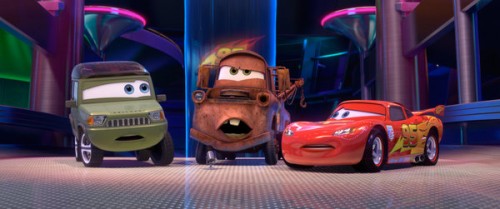
The release of Cars 2 this past summer marked the first Pixar movie to receive almost unanimously poor reviews. While some of this criticism was probably veiled jealousy of Pixar’s consistent success, I still have to admit that this film lacked the heart-tugging storytelling I’ve come to expect. The film has lots of flash – with some enthralling technical wizardry, but the substance was disappointingly thin. Or better, I didn’t enthusiastically identify with any of the characters.

The success of a movie usually depends upon the audience’s ability to sympathize with the main character – if we don’t care about them, why would we be interested at all? If the first Cars movie centered on the arrogant, yet lonely, Lightening McQueen, Cars 2 is devoted to his dim-witted best friend, Mater. But by any standard of likability, Mater fails miserably. His antics are childishly abrasive (not to mention unfunny). What often appears to be Mater’s simple ignorance of others seems more like selfish disregard. Even Mater’s best quality, loyalty, ropes McQueen into a race he didn’t want to be in (see clip below). In short, there is little reason to like Mater at all. Rather than feeling sympathy for Mater, the audience is uncomfortably annoyed (or at least that was my reaction!).
But maybe that’s really the point. Instead of endearing ourselves to Mater, we sympathize with McQueen against Mater. We begin to believe that Matter is a drag – he ropes McQueen into a race he didn’t want to run, Mater embarrasses McQueen at parties (see here), and McQueen loses the race because of Mater’s naivety. Perhaps McQueen is really better off without Mater holding him back? Humanly speaking, there is no reason why these two cars should be friends in the first place. Friends are supposed to help each other, right? How can McQueen still be friends with such a chore of a person? It is within this issue that Cars 2 really finds its thematic footing in a way that might atone for its shortcomings. I would suggest that through the patent dislike of Mater, perhaps Cars 2 inadvertently exposes the bias of the audience against those who, like Mater, don’t contribute to my well-being. If you don’t like Mater, it probably reveals something about you.

The friendship of Mater and McQueen is, to put it lightly, asymmetrical. This statement about friendship is a powerful one. If Aristotle understood the ideal friendship (philios) as a reciprocally beneficial relationship between two equally virtuous people, Cars 2 turns this on its head. McQueen wrongly spurns Mater precisely because he deems his friendship to Mater to be of no benefit to him. Similarly, the friendship is restored not when Mater proves his worth to McQueen, but McQueen apologizes the first chance he gets – ironically when it appears as though Mater is ruining yet another race for McQueen. Despite the obvious deficiencies of Mater (and McQueen for that matter!), Mater and McQueen remain friends – and that’s really the point of it all.
The friendship between Mater and McQueen functions not on the basis of mutual benefit, score-keeping, or quid-pro-quo, but out of sheer devotion to the other person. This asymmetrical friendship between Mater and McQueen is, for all its failures, a friendship which operates outside of karmic conditionality.
It is this type of unconditional devotion which is the foundation of God’s relation to broken humanity and our relationships with each other. The sending of Jesus is a unilateral act on our behalf without precondition – or as the Gospel of Mark reports: “It is not the healthy who need a doctor, but the sick. I have not come to call the righteous, but sinners.” Our relationship to God is, to put it lightly, asymmetrical. Though we were unworthy, unrighteous, ungodly, and though we thwart God at every possible turn, his promise for us remains unwavering. The truth is that we are all like Mater (and McQueen), and yet remarkably God loves us still. God is our friend not because we are deserving of his friendship, but because of his endless devotion.
For more from Mockingbird on Pixar, check out our book!

COMMENTS
Leave a Reply












